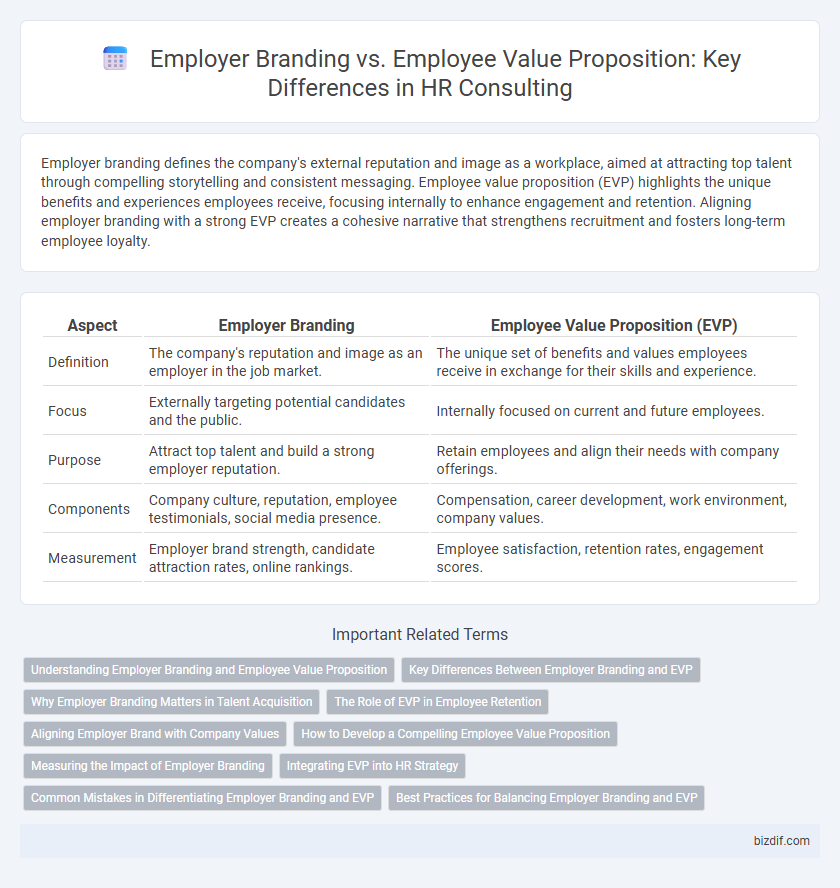Employer branding defines the company's external reputation and image as a workplace, aimed at attracting top talent through compelling storytelling and consistent messaging. Employee value proposition (EVP) highlights the unique benefits and experiences employees receive, focusing internally to enhance engagement and retention. Aligning employer branding with a strong EVP creates a cohesive narrative that strengthens recruitment and fosters long-term employee loyalty.
Table of Comparison
| Aspect | Employer Branding | Employee Value Proposition (EVP) |
|---|---|---|
| Definition | The company's reputation and image as an employer in the job market. | The unique set of benefits and values employees receive in exchange for their skills and experience. |
| Focus | Externally targeting potential candidates and the public. | Internally focused on current and future employees. |
| Purpose | Attract top talent and build a strong employer reputation. | Retain employees and align their needs with company offerings. |
| Components | Company culture, reputation, employee testimonials, social media presence. | Compensation, career development, work environment, company values. |
| Measurement | Employer brand strength, candidate attraction rates, online rankings. | Employee satisfaction, retention rates, engagement scores. |
Understanding Employer Branding and Employee Value Proposition
Employer branding defines an organization's public reputation and attractiveness as a workplace, influencing talent acquisition and retention strategies. Employee Value Proposition (EVP) represents the unique set of benefits and rewards employees receive in exchange for their skills and experience, directly impacting employee engagement and satisfaction. Understanding the distinction between employer branding and EVP enables HR consulting professionals to design cohesive talent strategies that align external perceptions with internal employee experiences.
Key Differences Between Employer Branding and EVP
Employer branding represents the external perception and reputation of a company as an employer, emphasizing how the organization is viewed by potential candidates and the general public. Employee Value Proposition (EVP) defines the unique set of benefits, culture, and opportunities that the company offers to its current employees, focusing on internal motivation and retention. Key differences include employer branding targeting external attraction strategies, while EVP concentrates on internal engagement and value delivery to employees.
Why Employer Branding Matters in Talent Acquisition
Employer branding plays a crucial role in talent acquisition by shaping how potential candidates perceive a company's culture, values, and work environment, directly influencing their decision to apply or accept job offers. A strong employer brand increases candidate trust and engagement, reduces recruitment costs, and enhances the quality of hires by attracting individuals whose values align with the organization's mission. While the employee value proposition (EVP) defines the unique benefits and rewards employees receive, employer branding effectively communicates this EVP externally to build a compelling reputation in the talent market.
The Role of EVP in Employee Retention
Employee Value Proposition (EVP) plays a pivotal role in employee retention by clearly defining the unique benefits, culture, and career opportunities an organization offers its workforce, which directly influences job satisfaction and loyalty. A strong EVP aligns employee expectations with company goals, reducing turnover rates and increasing engagement through tailored recognition, development programs, and work-life balance initiatives. Distinct from broader employer branding efforts that shape external reputation, EVP delivers a targeted internal experience that fosters long-term commitment and drives organizational performance.
Aligning Employer Brand with Company Values
Aligning the employer brand with company values enhances authenticity and attracts talent that resonates with the organizational culture. A strong Employee Value Proposition (EVP) communicates genuine benefits and work experiences that reflect these core values, fostering employee engagement and retention. Effective alignment ensures consistency in messaging across recruitment, onboarding, and internal communications, driving employer brand credibility.
How to Develop a Compelling Employee Value Proposition
Developing a compelling Employee Value Proposition (EVP) starts with understanding the core needs and motivations of current and potential employees through data-driven insights and comprehensive workforce analysis. Tailor the EVP to highlight unique benefits, career development opportunities, and company culture that align with employees' values and aspirations. Consistently communicate the EVP internally and externally to strengthen employer branding and attract top talent.
Measuring the Impact of Employer Branding
Measuring the impact of employer branding involves evaluating key performance indicators such as employee engagement, retention rates, and applicant quality to determine how effectively the brand attracts and retains talent. Data from employee surveys, social media sentiment analysis, and recruitment metrics provide valuable insights into the alignment between employer branding strategies and employee experiences. These measurements help HR consultants optimize employer branding efforts to strengthen the employee value proposition and enhance organizational reputation.
Integrating EVP into HR Strategy
Integrating Employee Value Proposition (EVP) into HR strategy strengthens employer branding by aligning organizational values with employee expectations, enhancing talent attraction and retention. A well-defined EVP communicates unique benefits and workplace culture, driving employee engagement and positioning the company as an employer of choice. Effective integration ensures consistency across recruitment, onboarding, and internal communications, maximizing workforce satisfaction and brand reputation.
Common Mistakes in Differentiating Employer Branding and EVP
Common mistakes in differentiating employer branding and employee value proposition often stem from confusing employer branding as purely external marketing while EVP encompasses internal employee experiences. Many organizations fail to align their EVP with authentic employee insights, leading to employer branding that lacks credibility and resonates poorly with potential candidates. Overlooking the integration between EVP and employer branding weakens talent attraction and retention strategies.
Best Practices for Balancing Employer Branding and EVP
Effective employer branding combines authentic storytelling with a compelling employee value proposition (EVP) that highlights unique benefits, culture, and growth opportunities to attract and retain talent. Best practices include aligning EVP with employer brand messaging, regularly gathering employee feedback for continuous improvement, and leveraging data-driven insights to tailor communication strategies across platforms. Integrating these elements ensures consistent brand perception and enhances organizational reputation in competitive talent markets.
Employer branding vs employee value proposition Infographic

 bizdif.com
bizdif.com